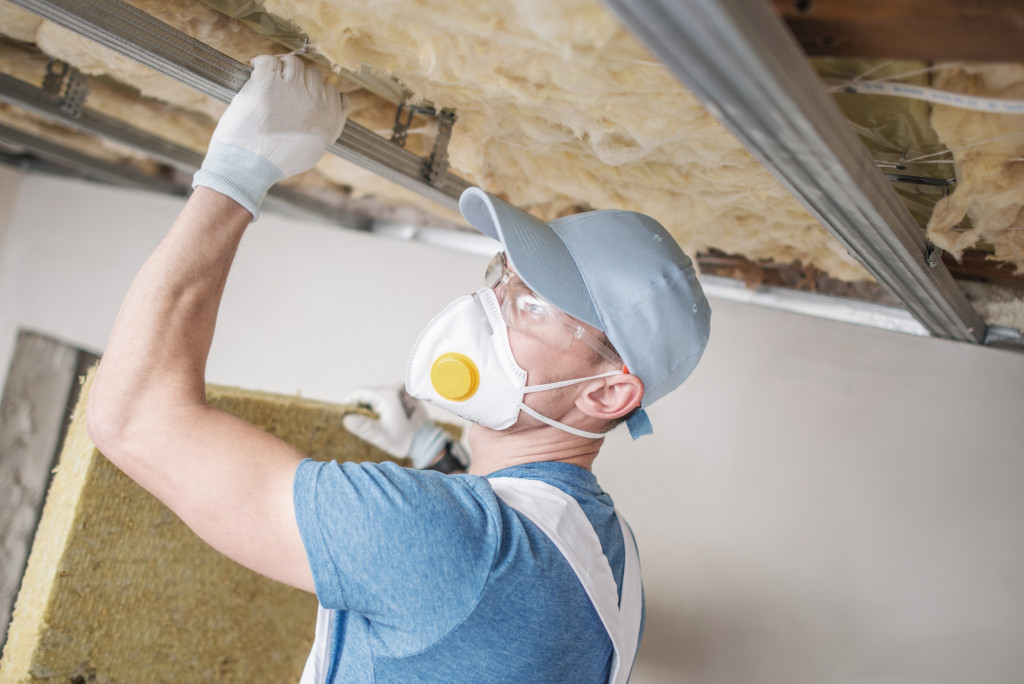- Proper insulation promotes energy efficiency. Get an estimate of the energy efficiency of your property through an EPC.
- Proper insulation promotes improved indoor air quality, reducing the chances of mold, mildew, and bacteria growth in a building.
- It reduces noise levels by creating a barrier between your property and external environments.
- Proper insulation can also decrease maintenance costs and reduce the need for pest control.
- Proper insulation involves using the right type of materials, as well as air sealing to prevent drafts from entering the property.
As a real estate investor, you know that ensuring tenants’ safety, comfort, and satisfaction should be one of your top priorities. The property you manage or own should provide the right level of comfort to your tenants, especially during extreme temperatures.
Proper insulation is one of the most important aspects of a building that directly influences the comfort of your tenants. Without it, your property might be difficult to heat or cool, resulting in rising utility bills and unhappy tenants. In this blog, you’ll learn how proper insulation can benefit your residential real estate investment.
Energy efficiency.
One of the top reasons why proper insulation is essential is it promotes energy efficiency. With adequate insulation, buildings can effectively retain the heat in winter and keep cool air in summer. This means your tenants won’t need to rely on heating or air conditioning systems as often, thereby reducing power usage and utility bills.
If you’re curious to know how much your insulation is saving you each year, consider getting a domestic energy performance certificate (EPC) inspection. This will provide you with an estimate of the energy efficiency of your property. Plus, having an EPC that proves your property is energy-efficient will make it very attractive to potential tenants.
Improved indoor air quality.

Improper insulation generates unwanted moisture and drafts and can ultimately compromise indoor air quality. As a result of poor indoor air quality, renters may suffer allergic reactions or respiratory infections.
Proper insulation promotes the comfort of tenants by reducing the chances of mold, mildew, and bacteria growth in a building. This improves indoor air quality, making living and working spaces more comfortable and healthier for everyone inside.
Noise reduction.
Another key benefit of proper insulation is the reduction of noise levels. If your rental property is located close to a busy road or loud urban areas, poor insulation could mean more noise and discomfort for yourself and your tenants. Proper insulation decreases traffic noise and unwanted sounds by creating a barrier between the property and the external environment.
Increased resale value.
Well-insulated real estate investments typically have a greater resale value because they represent long-term savings on utility bills and reduced maintenance costs. An energy-efficient home has a lower carbon footprint, and eco-friendly properties are becoming increasingly popular among renters, including young professionals and environmentally friendly concerns. Anyone in search of a property with inexpensive operating costs, low environmental effects, and comfortable living conditions would consider well-insulated buildings.
Lower maintenance costs.
The correct insulation has financial and maintenance benefits. For instance, after installing proper insulation, the damage to the property’s interior, including your walls, floors, and infrastructure, can reduce significantly.
It also decreases the possibility of pest infestations by eliminating gaps that make good hiding places. As a result, you won’t need to spend money on making repairs, pest control, or spending additional cash on utility expenses.
Tips for insulating your property.
Now that you know the advantages of proper insulation, you need to ensure that the insulation in your rental property meets certain standards. Here are a few tips to get you started:
Use the right type and quality of insulation.
Ensure that your property is properly insulated with materials designed for residential use. Don’t settle for inferior building materials.
Consider air sealing.
Air sealing helps to prevent air leaks, drafts, and airborne moisture from entering the property. Air sealing is especially important if your property has gaps between the walls and floorboards.
Check your insulation regularly.

As part of your routine maintenance, inspect the insulation in each room and make any necessary repairs or replacements to ensure that it’s up to standard.
Inspect the attic and exterior walls.
The attic and exterior walls are often overlooked when it comes to insulation, but they still need to be inspected for any signs of damage or air leaks. Properly insulating these areas will help you save energy and money in the long run.
By taking the proper steps to ensure your residential real estate property has the right insulation, you can reap the benefits of a comfortable, energy-efficient home with lower utility bills and maintenance costs.
Proper insulation for your residential real estate property is essential to ensure the safety and comfort of tenants. It can help reduce energy bills, improve indoor air quality, minimize noise levels, increase resale value, and lower maintenance costs.
By taking the right steps, such as using the correct type and quality of insulation material or inspecting regularly, you will be able to reap all these benefits while keeping your rental property in top condition. Investing the time and money into properly insulating your property now will pay off significantly down the road!







